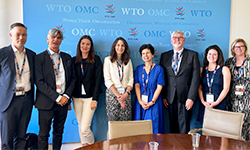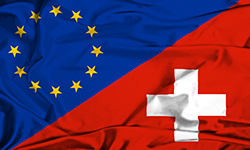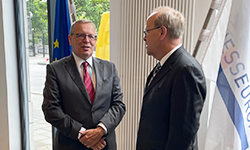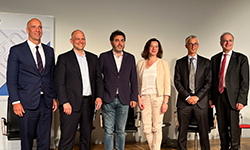BusinessEurope Headlines No. 2022-21
Discussing bilateral cooperation with Members of the National Assembly of South Korea

BusinessEurope Director General Markus J. Beyrer met a delegation of Members of the National Assembly of South Korea on 13 June to discuss the implementation of the bilateral free trade agreement (FTA) as well as environmental, social governance and climate-related issues. The FTA represents a platform for closer bilateral cooperation and engagement on a number of topics of mutual importance: trade and sustainable development, the fight against climate change and the green transition are high on the political agenda in Europe and we hope to advance progress in these areas at the multilateral level too, with the help of partners like South Korea. Beyrer praised the recent ratification of three International Labour Organisation core conventions (April 2021). “We look forward to their effective implementation and continue to hope that also the last outstanding convention concerning the complete abolition of forced labour will be ratified soon”, he concluded.
Contact: Eleonora Catella
12th WTO Ministerial Conference – still ongoing and stakes are high
 The 12th Ministerial Conference of the World Trade Organisation (WTO) is currently ongoing in Geneva. Initially expected to end on Wednesday afternoon, it has been extended to today, in the hope to deliver concrete outcomes, in areas such as fisheries subsidies; trade & health, including a deal on Trade-Related Aspects of Intellectual Property Rights (TRIPs) that would facilitate access to vaccines; as well as food security; and – most importantly for European business, the renewal of the moratorium on customs duties on electronic transactions. The stakes are high, as this is considered a “make or break” moment for the WTO, which has been in a deep institutional crisis in the past few years. BusinessEurope remains committed to multilateralism and a rules-based trading order. We are particularly concerned by the lack of progress in the negotiations, as the rigid position of some WTO members risks derailing the process, leading to outcomes that are against the principles of open and rules-based trade. We hope the final outcome of the Ministerial will include the renewal of the e-commerce moratorium, while at the same time, any agreement on trade and health that addresses the root causes of the problems and does not undermine the TRIPs agreement and the protection of intellectual property rights. BusinessEurope representatives are in Geneva, supporting the WTO and pushing for ambitious outcomes that take business interests into account.
The 12th Ministerial Conference of the World Trade Organisation (WTO) is currently ongoing in Geneva. Initially expected to end on Wednesday afternoon, it has been extended to today, in the hope to deliver concrete outcomes, in areas such as fisheries subsidies; trade & health, including a deal on Trade-Related Aspects of Intellectual Property Rights (TRIPs) that would facilitate access to vaccines; as well as food security; and – most importantly for European business, the renewal of the moratorium on customs duties on electronic transactions. The stakes are high, as this is considered a “make or break” moment for the WTO, which has been in a deep institutional crisis in the past few years. BusinessEurope remains committed to multilateralism and a rules-based trading order. We are particularly concerned by the lack of progress in the negotiations, as the rigid position of some WTO members risks derailing the process, leading to outcomes that are against the principles of open and rules-based trade. We hope the final outcome of the Ministerial will include the renewal of the e-commerce moratorium, while at the same time, any agreement on trade and health that addresses the root causes of the problems and does not undermine the TRIPs agreement and the protection of intellectual property rights. BusinessEurope representatives are in Geneva, supporting the WTO and pushing for ambitious outcomes that take business interests into account.
Contact: Sofia Bournou
Enabling legitimate trade and controlling customs risks: getting the balance right
 Speaking at a European Parliament workshop on "EU Customs Control Mechanisms and Their Possible Improvement” on 15 June, Luisa Santos, Deputy Director General at BusinessEurope, highlighted that EU Customs are a key asset of the EU and essential for the proper functioning of the Single Market. They have a key role in controlling the products that enter the EU, which helps to ensure a level playing field for EU companies that have to comply with high standards. But customs are also vital in facilitating trade, which is essential for the competitiveness of the European industry. Santos emphasised the need to get the balance right between control and trade facilitation, and proposed four main areas of focus: 1) having effective, business-friendly customs process with attention to digitalisation; 2) restoring the balance between customs obligations and simplifications, e.g. by implementing the authorised economic operator and centralised customs clearance; 3) having customs policies that facilitate trade, with e.g. simple rules of origin, modern HS codes and proper implementation of trade agreements; 4) expanding the role of customs in the future, e.g. by increasing security and sustainability concerns, and tackling challenges to global supply chains. The promotion of regulatory cooperation and international standards will be important, Santos concluded.
Speaking at a European Parliament workshop on "EU Customs Control Mechanisms and Their Possible Improvement” on 15 June, Luisa Santos, Deputy Director General at BusinessEurope, highlighted that EU Customs are a key asset of the EU and essential for the proper functioning of the Single Market. They have a key role in controlling the products that enter the EU, which helps to ensure a level playing field for EU companies that have to comply with high standards. But customs are also vital in facilitating trade, which is essential for the competitiveness of the European industry. Santos emphasised the need to get the balance right between control and trade facilitation, and proposed four main areas of focus: 1) having effective, business-friendly customs process with attention to digitalisation; 2) restoring the balance between customs obligations and simplifications, e.g. by implementing the authorised economic operator and centralised customs clearance; 3) having customs policies that facilitate trade, with e.g. simple rules of origin, modern HS codes and proper implementation of trade agreements; 4) expanding the role of customs in the future, e.g. by increasing security and sustainability concerns, and tackling challenges to global supply chains. The promotion of regulatory cooperation and international standards will be important, Santos concluded.
Contact: Elena Suárez
Moving the EU-Swiss bilateral relations forward
 “In order to realise the full potential of this politically and economically important relationship, the existing internal market agreements need to be updated and supplemented with institutional rules. From a business perspective, the current patchwork of bilateral agreements between the EU and Switzerland leads to uncertainty, with a direct negative impact on economic relations”, argue BusinessEurope, Economiesuisse and the Union of Employers of Switzerland in a letter sent to the EU and Swiss authorities on 15 June. We hope that the renewed commitment of the Swiss government to continuing the bilateral path with the EU will soon lead to the launch of negotiations. A broad package of issues needs to be addressed in this regard, including institutional questions and strengthening the European energy market, supply chains and research and innovation basis.
“In order to realise the full potential of this politically and economically important relationship, the existing internal market agreements need to be updated and supplemented with institutional rules. From a business perspective, the current patchwork of bilateral agreements between the EU and Switzerland leads to uncertainty, with a direct negative impact on economic relations”, argue BusinessEurope, Economiesuisse and the Union of Employers of Switzerland in a letter sent to the EU and Swiss authorities on 15 June. We hope that the renewed commitment of the Swiss government to continuing the bilateral path with the EU will soon lead to the launch of negotiations. A broad package of issues needs to be addressed in this regard, including institutional questions and strengthening the European energy market, supply chains and research and innovation basis.
![]() Contact: Sofia Bournou
Contact: Sofia Bournou
Job quality yes, but first employment creation
 BusinessEurope discussed the topic of job quality during the opening panel of the “Future of Work and Inclusive Growth Annual Conference”, organised by Bruegel on 7 June. The topic of job quality must be discussed in the current context of the twin transition (green and digital), serious labour shortages across the EU, relatively high inactivity rate and disruptions of the European economies and labour markets caused by the Russian aggression in Ukraine. It is important to note that ensuring favourable business environment that supports job creation and entrepreneurship is the basic condition for creating good quality jobs. Businesses audit work posts on a regular basis to make sure they are productive and correspond to their business goals. They also regularly assess workers’ skills as creating and maintaining quality jobs without upskilling/reskilling is not possible. This is even more important in the current twin transition and the need of digital skills for all workers across the whole spectrum of positions and occupations. Different factors determine the quality of a job: pay level, working conditions, reskilling/upskilling options, perspectives of professional advancement or flexibility in the work organisation. All these elements are best decided between employers and workers at the sectoral/company level given the specificity of workers’ needs and different capacity to accommodate these needs by each company. These were the key messages delivered by Anna Kwiatkiewicz-Mory, BusinessEurope Senior Adviser on Social Affairs during her presentation. She concluded that a quality job not only brings income, but also offers opportunities for professional development and is a source of individual satisfaction. For employers, a good quality job is the one that brings added value and allows employees to develop their talents and flourish professionally.
BusinessEurope discussed the topic of job quality during the opening panel of the “Future of Work and Inclusive Growth Annual Conference”, organised by Bruegel on 7 June. The topic of job quality must be discussed in the current context of the twin transition (green and digital), serious labour shortages across the EU, relatively high inactivity rate and disruptions of the European economies and labour markets caused by the Russian aggression in Ukraine. It is important to note that ensuring favourable business environment that supports job creation and entrepreneurship is the basic condition for creating good quality jobs. Businesses audit work posts on a regular basis to make sure they are productive and correspond to their business goals. They also regularly assess workers’ skills as creating and maintaining quality jobs without upskilling/reskilling is not possible. This is even more important in the current twin transition and the need of digital skills for all workers across the whole spectrum of positions and occupations. Different factors determine the quality of a job: pay level, working conditions, reskilling/upskilling options, perspectives of professional advancement or flexibility in the work organisation. All these elements are best decided between employers and workers at the sectoral/company level given the specificity of workers’ needs and different capacity to accommodate these needs by each company. These were the key messages delivered by Anna Kwiatkiewicz-Mory, BusinessEurope Senior Adviser on Social Affairs during her presentation. She concluded that a quality job not only brings income, but also offers opportunities for professional development and is a source of individual satisfaction. For employers, a good quality job is the one that brings added value and allows employees to develop their talents and flourish professionally.
Contact: Anna Kwiatkiewicz-Mory
Photo copyright: Bruegel/Antoine Doetsch
Tax Policy Group discusses corporate tax proposals with EU Commission
 As the European economy enters a difficult phase, EU tax proposals must support investment, competitiveness and growth. This was the main message of BusinessEurope's Tax Policy Group in an exchange of views on 9 June with Uwe Ihli, Head of Section, Corporate Tax Directives and Common Consolidated Corporate Tax Base, at the European Commission Directorate-General for Taxation and Customs Union. Referencing in particular, the proposed implementation in the EU of the OECD agreement on minimum taxation, the group noted the importance of ensuring that EU implementation is part of a global implementation effort that does not put EU companies at a competitive disadvantage. The meeting was the final one under the chairmanship of Krister Andersson, with members taking the chance to thank him for his outstanding service in this role over the past 17 years.
As the European economy enters a difficult phase, EU tax proposals must support investment, competitiveness and growth. This was the main message of BusinessEurope's Tax Policy Group in an exchange of views on 9 June with Uwe Ihli, Head of Section, Corporate Tax Directives and Common Consolidated Corporate Tax Base, at the European Commission Directorate-General for Taxation and Customs Union. Referencing in particular, the proposed implementation in the EU of the OECD agreement on minimum taxation, the group noted the importance of ensuring that EU implementation is part of a global implementation effort that does not put EU companies at a competitive disadvantage. The meeting was the final one under the chairmanship of Krister Andersson, with members taking the chance to thank him for his outstanding service in this role over the past 17 years.
Contact: James Watson
Debate on Basel implementation in challenging times
 The implementation of the final provision of Basel III within the EU should not lead to a reduction in EU companies’ investment. This was the key message of BusinessEurope’s Economics Director, James Watson, at an event jointly organised by the German Economic Institute and the Association of German Banks on 15 June entitled "Basel implementation in challenging times – How to find the right balance?". Speaking on a panel including MEP Jonás Fernández, rapporteur on the European Parliament’s recent banking package, James noted that there is a risk that the present proposals unduly damage investment by EU corporate firms, particularly vis a vis U.S. competitors, given the increasing importance foreseen of companies needing to obtain external credit ratings. These points build on BusinessEurope’s position paper on the issue published in March 2022.
The implementation of the final provision of Basel III within the EU should not lead to a reduction in EU companies’ investment. This was the key message of BusinessEurope’s Economics Director, James Watson, at an event jointly organised by the German Economic Institute and the Association of German Banks on 15 June entitled "Basel implementation in challenging times – How to find the right balance?". Speaking on a panel including MEP Jonás Fernández, rapporteur on the European Parliament’s recent banking package, James noted that there is a risk that the present proposals unduly damage investment by EU corporate firms, particularly vis a vis U.S. competitors, given the increasing importance foreseen of companies needing to obtain external credit ratings. These points build on BusinessEurope’s position paper on the issue published in March 2022.
![]() Contact: Erik Berggren
Contact: Erik Berggren
Calendar 
- 26-28 June: G7 Germany 2022
- 27-29 June: Conference on Industrial Technologies IndTech 2022
- 28-30 June: Connecting Europe Days
- 30 June: BusinessEurope event: Chemicals regulation - from European industry to society
- 1 July: BusinessEurope event: Morning Talks on International Issues No.5
Not yet a subscriber? Register here.
Reminder: please have a look at our privacy policy